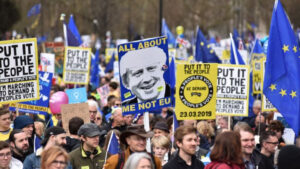
Timothy Rush | Staff Columnist
The United Kingdom is a country divided over the looming shadow of Brexit, Britain’s exiting of the European Union. On Sept. 5, the U.K. Parliament voted to push the Brexit deadline back, for a third time, to Jan. 31. This vote shattered what was Prime Minister Boris Johnson’s working majority in parliament, which also turned down his bid to have a snap election that he had hoped would better secure his majority. The U.K. Parliament was formally prorogued, suspended without being dissolved, on Tuesday, Sept. 9, by Queen Elizabeth II at Prime Minister Johnson’s request.
Why is it that leaving the EU is so tumultuous right now? It is because of the lack of a deal by the U.K. government over how they will leave the EU. The first option is a soft Brexit, wherein the U.K. will leave the EU but maintain strong economic ties with the union. This is supported by most moderate Brexiteers. A hard Brexit is where the U.K. will leave and sever ties with the EU, while still negotiating matters such as continuing trade relations, as well as the Irish border. The final option, supported by a minority and the reason why the U.K. has opted to delay the vote, is a no-deal Brexit, where the U.K. will leave the EU without any negotiated deal that will settle matters of trade or the Irish border.
The answer here, in my mind as an American from across the Atlantic, is that the U.K. must reach a deal soon. While a remain victory would be very ideal, short of a second referendum being called it’s not likely. Prime Minister Boris Johnson, in line with his archetype as the British Donald Trump, has taken on the role as the strong negotiator for Brexit. Johnson, who has been a supporter of Brexit for much of his political career, has gone so far as to say that he will go to Brussels, where the EU Parliament is held, and negotiate the exit of the U.K. with or without a deal.
Aside from the fact that this rhetoric is very dangerous, a no-deal Brexit would see an overwhelming economic hardship for the U.K. Due to years of economic cooperation between the U.K., and other EU countries, the economies are heavily tied into the single-market. A no-deal Brexit would result in a quick and immediate cut in the economic ties that the U.K. market has with the EU, which would negatively impact U.K. business throughout the country. The matter of the Irish border would also be left unresolved, leading to horrid results for those along the said border.
With a no-deal Brexit being the worst outcome, they are left with two options: a soft or hard Brexit. These choices are not great, and are indeed very complex. Working out every single detail within said choices are prolonging negotiations. Again, while remaining in the EU would indeed be most ideal, it’s not likely without a call for a second referendum.
In the wake of being prorogued, there has been talk of calling a vote of “no confidence” in Prime Minister Johnson. This is not necessarily a bad idea. The man is the one that got the Queen to prorogue Parliament in the first place, pushing back Brexit negotiation back till Oct. 14, only 17 days shy of the previous Oct. 31 deadline. While I think anyone can understand the spirit of this, myself included, it does not change the dire situation that the U.K. is in. The U.K. must decide on a Brexit deal sooner rather than later. Delaying it continuously will not help the situation. The U.K. has already begun experiencing a decline in growth in the looming shadow of Brexit, with 2019 marking the third time in the decade that the U.K. declined in GDP.
This matter is one of importance for everyone, even Americans. The U.K. is one of the strongest economic partners and allies of the U.S. A no-deal Brexit would result in an economic catastrophe, in which the effects would be felt by nations around the world.
With a no-deal being catastrophic, and a remain victory being unlikely, the options that remain are the variations of a hard or a soft Brexit. It is a choice that has to be made, and unfortunately, I don’t think it’s an issue that can be strong-armed to meet the desired hardliners on either side. The U.K. Parliament needs to reach an agreement soon, or the economic uncertainty that is breeding negative effects on the U.K. economy is not going to stop.
Between the two, a soft Brexit is very preferable. This would give the U.K. a continuing strong tie to the EU single market, providing U.K. businesses better economic resources and opportunities in the wake of Brexit the side that has the best options for the Irish border. Regardless, a decision must be made, because another delay and proroguing the Parliament is only going to hurt the U.K.

